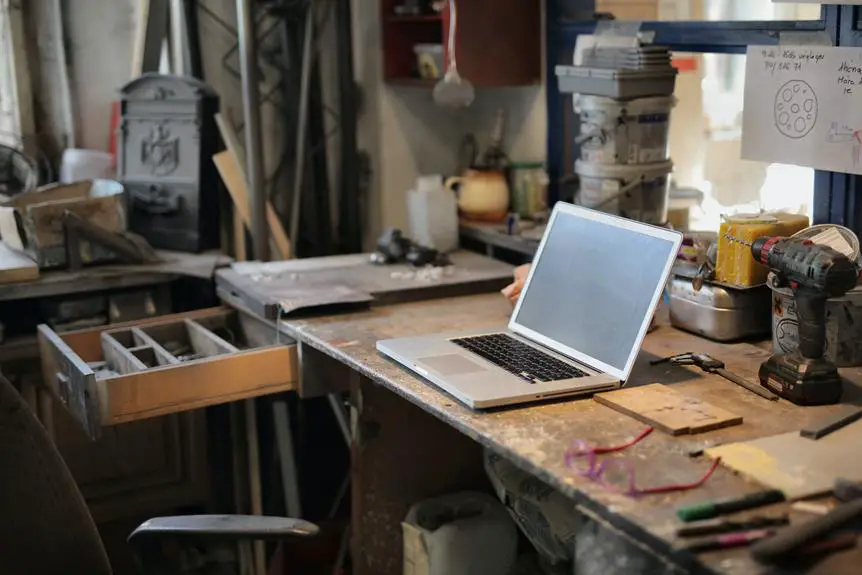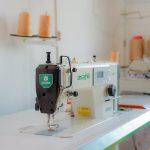Looking for the ideal fusing machine to enhance your fabric projects? Choosing the right equipment can significantly impact the quality and durability of your creations. With various types and features to consider, selecting the best fusing machine requires careful evaluation.
Whether you're working with delicate fabrics or heavy-duty materials, understanding the factors at play is crucial. This guide will provide you with detailed insights to help you make an informed decision tailored to your specific project requirements.
Key Takeaways
- The type of fusing machine (manual, semi-automatic, or fully automatic) should be chosen based on the scale of your fabric projects.
- Proper maintenance, including regular cleaning and calibration, is crucial for consistent and high-quality results.
- Fabric type compatibility and thickness should be considered when selecting a fusing machine.
- Adjusting temperature and pressure settings according to fabric and adhesive requirements is essential for successful bonding.
Types of Fusing Machines
When choosing a fusing machine for your fabric projects, you'll encounter various types that cater to different fabric materials and project requirements. Understanding fusing machine applications is crucial to making the right choice. The most common types of fusing machines are manual, semi-automatic, and fully automatic.
Manual machines require more hands-on control and are suitable for smaller scale projects. Semi-automatic machines offer a middle ground, providing some automation while still allowing for manual adjustments. Fully automatic machines are ideal for larger scale production, offering high efficiency and consistency.
Maintenance and care are essential for ensuring the longevity and optimal performance of your fusing machine. Regular cleaning of the heating elements, belts, and rollers is necessary to prevent adhesive buildup and ensure smooth operation. Additionally, proper calibration and alignment of the machine components are crucial for achieving consistent and high-quality fusing results.
Understanding the specific maintenance requirements of your chosen fusing machine type is vital for maximizing its lifespan and performance. Regularly referring to the manufacturer's guidelines for maintenance and care will help you keep your fusing machine in top condition.
Factors to Consider
When choosing a fusing machine for your fabric projects, consider the fabric type compatibility, temperature and pressure settings, as well as the size and portability of the machine.
These factors will directly impact the quality and efficiency of your fusing process.
Fabric Type Compatibility
Are you wondering which fusing machine best suits your fabric projects based on the type of fabric you work with? When considering fabric type compatibility, two crucial factors to take into account are fabric thickness and adhesive compatibility.
Different fabrics have varying thickness levels, and it's essential to choose a fusing machine that can handle the thickness of the fabric you're working with.
Additionally, not all adhesives are suitable for all fabric types. Some fabrics may require a specific type of adhesive for successful bonding during the fusing process. Therefore, it's important to ensure that the fusing machine you choose is compatible with the adhesive that works best for your fabric type.
Understanding these fabric-specific considerations will help you select the most suitable fusing machine for your fabric projects.
Temperature and Pressure Settings
To achieve optimal results, adjust the temperature and pressure settings of your fusing machine according to the fabric and adhesive requirements. Proper heat distribution is crucial for successful fusing. Different fabrics and adhesives require specific temperature and pressure settings to ensure a strong bond without damaging the fabric. Additionally, consider the time efficiency when setting the temperature and pressure. Finding the right balance between heat and pressure can significantly impact the overall quality and durability of your fabric projects. Refer to the table below for a general guideline on temperature and pressure settings based on fabric types and adhesive requirements.
| Fabric Type | Adhesive Type | Temperature Setting | Pressure Setting |
|---|---|---|---|
| Cotton | Fusible Interfacing | 300°F | Medium |
| Wool | Heat-Activated | 275°F | High |
| Polyester | Adhesive Film | 260°F | Low |
Size and Portability
Consider the number of fabric projects you typically work on and evaluate how the size and portability of a fusing machine will impact your workflow and storage options. When considering size and portability, power efficiency and compact design are key factors.
Look for a machine that offers the necessary power in a compact design, allowing you to work efficiently without taking up excessive space. Additionally, versatility and transportation convenience are important.
A portable fusing machine should be versatile enough to handle various project sizes and types of fabric, while also being easy to transport to different work locations. Ultimately, the size and portability of the fusing machine should complement your work style and provide the convenience you need for your fabric projects.
Best Fusing Machine for Delicate Fabrics
When working with delicate fabrics, opt for a fusing machine with a lower temperature setting to prevent damage and ensure a secure bond. Sensitive fabrics, such as silk, chiffon, and lace, require precise heat control to avoid scorching or warping.
Look for a fusing machine that offers gentle bonding and precision technology. These machines are designed to provide even heat distribution at lower temperatures, minimizing the risk of ruining delicate materials.
Additionally, consider a fusing machine with adjustable pressure settings to prevent excessive force on delicate fabrics, which could lead to puckering or stretching. Some models also come with specialized Teflon-coated plates to further protect delicate fabrics from heat damage during the fusing process.
Prioritize fusing machines that have a proven track record of effectively bonding delicate fabrics without causing any harm. By investing in a fusing machine tailored for delicate fabrics, you can ensure that your projects maintain their integrity and beauty without compromising on quality or durability.
Best Fusing Machine for Heavy-Duty Projects
Looking for a fusing machine for heavy-duty projects? When it comes to handling heavy-duty fabric projects, you need a fusing machine with industrial strength and the capability to deliver professional results. Here are some options to consider:
- SINGER Magic Steam Press: This industrial-grade fusing machine offers a large pressing surface and adjustable steam settings, making it suitable for heavy fabrics like denim and canvas. It provides professional results with its powerful steam and precise temperature control.
- Oliso Pro TG1600 Smart Iron: This heavy-duty fusing machine is designed for professional use, with its extended auto-shut off feature and triple play continuous steam for efficient fusing of heavyweight fabrics. It ensures industrial-strength performance and consistent, professional results.
- Reliable 3000IS Professional Ironing System: With its commercial-grade iron and steam boiler, this fusing machine is ideal for heavy-duty projects. It delivers industrial-strength steam pressure and heat for tackling tough fabrics, ensuring professional results every time.
When choosing a fusing machine for heavy-duty projects, prioritize features like robust steam capabilities, precise temperature control, and durable construction to achieve professional results on tough fabrics.
Budget-Friendly Options
For those on a tight budget, consider the Brother CS6000i Sewing and Quilting Machine as a cost-effective fusing option. This machine is an excellent choice for those seeking affordable options without compromising on quality.
Brother CS6000i is a versatile entry-level model that offers a wide range of features suitable for various fabric projects. It comes with 60 built-in stitches, including decorative and quilting stitches, making it a great option for both fusing and sewing tasks.
The machine also features an automatic needle threader, adjustable sewing speed, and a quilting table, providing convenience and flexibility while working on your projects. Additionally, its detachable wide table allows for handling larger fabric projects with ease.
The Brother CS6000i Sewing and Quilting Machine is designed to be user-friendly, making it an ideal choice for beginners and experienced sewers looking for a reliable yet budget-friendly fusing machine.
With its affordable price point and robust features, this machine is an excellent investment for those seeking a cost-effective fusing solution.
Advanced Features to Look For
When choosing a fusing machine with advanced features, it's crucial to look for the following:
- Innovative Technology for Efficiency Improvements: Seek out fusing machines that incorporate innovative technology such as advanced heating elements or automated settings. These features can enhance efficiency by ensuring consistent and precise fusing results, while also reducing the time required for each project. Look for options with features like infrared heating technology or responsive temperature control systems to optimize the fusing process.
- Precision Control and User-Friendly Interface: Prioritize fusing machines that offer precise control over temperature, pressure, and timing, as these factors significantly impact the quality of your fabric projects. Additionally, a user-friendly interface with intuitive controls and programmable settings can streamline the fusing process, allowing you to achieve accurate and reliable results with ease. Consider models with digital displays, adjustable settings, and pre-programmed modes to simplify operation and customization.
- Enhanced Safety Features: Look for advanced safety features such as automatic shutoff mechanisms, temperature monitoring, and ergonomic design elements to ensure a secure and controlled fusing experience. Investing in a fusing machine with enhanced safety features can safeguard against accidents and improve overall peace of mind during operation.
Frequently Asked Questions
Can I Use the Same Fusing Machine for Both Delicate and Heavy-Duty Fabrics?
You can use the same fusing machine for delicate and heavy-duty fabrics if it's compatible with different fabric types. Look for a machine with adjustable settings and a wide temperature range to ensure proper fusing for various fabrics.
How Do I Maintain and Clean a Fusing Machine to Ensure Its Longevity?
To maintain and clean your fusing machine, follow these tips: Use a lint-free cloth and isopropyl alcohol for regular cleaning. Check and replace the Teflon sheet as needed. Stick to a maintenance schedule to ensure longevity.
Are There Any Safety Precautions I Need to Consider When Using a Fusing Machine?
When using a fusing machine, safety precautions are crucial. Always follow proper usage guidelines, regularly maintain the machine to ensure its longevity, and be mindful of potential hazards such as burns and electrical issues.
Can a Fusing Machine Be Used for Non-Fabric Materials, Such as Leather or Vinyl?
Yes, a fusing machine can be used for leather applications and vinyl projects. The machine's adjustable heat settings and pressure controls make it versatile for different materials, ensuring a strong bond without damaging the fabric.
Are There Any Specific Warranty or Customer Support Options Available for the Different Types of Fusing Machines?
When considering fusing machines, it's essential to factor in warranty options and customer support to ensure smooth operations. Different machines may offer varying warranties and customer service, so it's crucial to assess these factors alongside machine compatibility and fabric versatility.
- Tetron Fabric for Marine Applications: Durability and Use Cases - June 18, 2025
- Tetron Fabric for Outdoor Furniture: Weather Resistance and Care - June 18, 2025
- Tetron Fabric for Wall Coverings: Style and Application Tips - June 18, 2025




